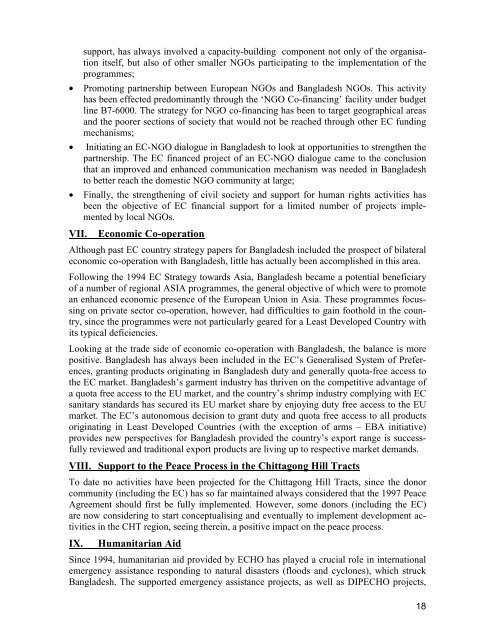EC Country Strategy Paper for Bangladesh 2002-2006
EC Country Strategy Paper for Bangladesh 2002-2006
EC Country Strategy Paper for Bangladesh 2002-2006
You also want an ePaper? Increase the reach of your titles
YUMPU automatically turns print PDFs into web optimized ePapers that Google loves.
support, has always involved a capacity-building component not only of the organisation<br />
itself, but also of other smaller NGOs participating to the implementation of the<br />
programmes;<br />
• Promoting partnership between European NGOs and <strong>Bangladesh</strong> NGOs. This activity<br />
has been effected predominantly through the ‘NGO Co-financing’ facility under budget<br />
line B7-6000. The strategy <strong>for</strong> NGO co-financing has been to target geographical areas<br />
and the poorer sections of society that would not be reached through other <strong>EC</strong> funding<br />
mechanisms;<br />
• Initiating an <strong>EC</strong>-NGO dialogue in <strong>Bangladesh</strong> to look at opportunities to strengthen the<br />
partnership. The <strong>EC</strong> financed project of an <strong>EC</strong>-NGO dialogue came to the conclusion<br />
that an improved and enhanced communication mechanism was needed in <strong>Bangladesh</strong><br />
to better reach the domestic NGO community at large;<br />
• Finally, the strengthening of civil society and support <strong>for</strong> human rights activities has<br />
been the objective of <strong>EC</strong> financial support <strong>for</strong> a limited number of projects implemented<br />
by local NGOs.<br />
VII. Economic Co-operation<br />
Although past <strong>EC</strong> country strategy papers <strong>for</strong> <strong>Bangladesh</strong> included the prospect of bilateral<br />
economic co-operation with <strong>Bangladesh</strong>, little has actually been accomplished in this area.<br />
Following the 1994 <strong>EC</strong> <strong>Strategy</strong> towards Asia, <strong>Bangladesh</strong> became a potential beneficiary<br />
of a number of regional ASIA programmes, the general objective of which were to promote<br />
an enhanced economic presence of the European Union in Asia. These programmes focussing<br />
on private sector co-operation, however, had difficulties to gain foothold in the country,<br />
since the programmes were not particularly geared <strong>for</strong> a Least Developed <strong>Country</strong> with<br />
its typical deficiencies.<br />
Looking at the trade side of economic co-operation with <strong>Bangladesh</strong>, the balance is more<br />
positive. <strong>Bangladesh</strong> has always been included in the <strong>EC</strong>’s Generalised System of Preferences,<br />
granting products originating in <strong>Bangladesh</strong> duty and generally quota-free access to<br />
the <strong>EC</strong> market. <strong>Bangladesh</strong>’s garment industry has thriven on the competitive advantage of<br />
a quota free access to the EU market, and the country’s shrimp industry complying with <strong>EC</strong><br />
sanitary standards has secured its EU market share by enjoying duty free access to the EU<br />
market. The <strong>EC</strong>’s autonomous decision to grant duty and quota free access to all products<br />
originating in Least Developed Countries (with the exception of arms – EBA initiative)<br />
provides new perspectives <strong>for</strong> <strong>Bangladesh</strong> provided the country’s export range is successfully<br />
reviewed and traditional export products are living up to respective market demands.<br />
VIII. Support to the Peace Process in the Chittagong Hill Tracts<br />
To date no activities have been projected <strong>for</strong> the Chittagong Hill Tracts, since the donor<br />
community (including the <strong>EC</strong>) has so far maintained always considered that the 1997 Peace<br />
Agreement should first be fully implemented. However, some donors (including the <strong>EC</strong>)<br />
are now considering to start conceptualising and eventually to implement development activities<br />
in the CHT region, seeing therein, a positive impact on the peace process.<br />
IX. Humanitarian Aid<br />
Since 1994, humanitarian aid provided by <strong>EC</strong>HO has played a crucial role in international<br />
emergency assistance responding to natural disasters (floods and cyclones), which struck<br />
<strong>Bangladesh</strong>. The supported emergency assistance projects, as well as DIP<strong>EC</strong>HO projects,<br />
18

















